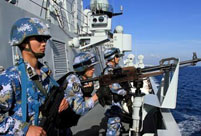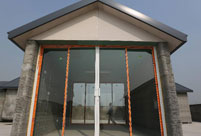 Ni Ni covers BAZAAR JEWELRY
Ni Ni covers BAZAAR JEWELRY
 Cherry blossoms reach peak bloom in Washington D.C.
Cherry blossoms reach peak bloom in Washington D.C.
 Top Chinese fashion icons in foreigners' eyes
Top Chinese fashion icons in foreigners' eyes
 Asia's largest business aviation exhibition to be held in Shanghai
Asia's largest business aviation exhibition to be held in Shanghai
 World's top-rated luxury hotels
World's top-rated luxury hotels
 Wu Jing, Xie Nan to hold wedding on May
Wu Jing, Xie Nan to hold wedding on May
 London Cake International attracts tourists
London Cake International attracts tourists
 Let's dance in harmonic Shaanxi
Let's dance in harmonic Shaanxi
 Christie's to auction dazzling diamonds
Christie's to auction dazzling diamonds
 'Model husband' shatters image of love
'Model husband' shatters image of love
Kiev authorities on Tuesday launched an "anti-terrorist operation" against "pro-Russian" armed forces in the eastern city Kramatorsk, opening a Pandora's box of the Ukrainian army bloodily quelling the pro-Russian faction. The escalation of the conflict put Ukraine on the verge of civil war. The entirety of Crimea independence has been clear and all parties quickly gave tacit consent to the outcome. However, if competition among different parties in Ukraine's eastern region is fully unleashed, the consequences will very likely become uncontrollable.
The Tuesday crushing of rebellions by the new Kiev administration shares a similarity with the crackdown on protesters who occupied the parliament in February. However, when then Ukrainian president Viktor Yanukovych commanded the crackdown on demonstrators, he was overwhelmed by Western denunciations and threats since the order was considered "bloody" and "inhumane."
On the contrary, Western public opinion has given sympathy and comprehension to Kiev's military operation against eastern rebels. Yanukovych was "suppressing democracy," while the acting Kiev authorities are believed to have carried out their legitimate State rights.
Domestic politics and geopolitical interests have become entangled and complicated the Ukraine situation. What is democracy and what is anti-democracy? How can we distinguish "suppressing" from "safeguarding order?" These will not be judged by objective standards but the power and influence of the judges.
The West is able to define various global conflicts due to the strength of its soft power. Things are judged based on the West's own interests rather than the facts. That's why the crackdowns in Ukraine in February and on Tuesday have gained sharply different Western comments. Such double standards have been widely used by the West. Turbulence, if occurring in countries that have a tense relationship with the West, are considered a "democratic revolution," but if the same situation happens in highly pro-Western countries, protesters will be viewed as radicals.
Because Western interests have penetrated the whole global discourse power system, terms such as "democracy" and "human rights" are added to the mix when the West tries to impose its will on the world. Developing countries face an arduous task to restore the original meaning of these terms.
The "democratic revolution" supported by the West has rarely brought about prosperity and stability over the past two decades. The future of those revolutionary countries is unclear. But one certain thing is that the "democratic revolution" has cleared away obstacles that prevent the West from realizing its geopolitical interests. After the disintegration of the Soviet Union, Ukraine has evolved into the forefront of geopolitical competition between the West and Russia. We can only understand what's going on in Ukraine from the perspective of geopolitics.
 Children in ancient costumes learn Zhusuan
Children in ancient costumes learn Zhusuan Tens of thousands celebrate Water Splashing Festival
Tens of thousands celebrate Water Splashing Festival A bite of China II whets the appetite
A bite of China II whets the appetite Chinese frigate completes its 14th escort mission
Chinese frigate completes its 14th escort mission Let's dance in wealthy Shaanxi
Let's dance in wealthy Shaanxi A date with 798: feel the art around you
A date with 798: feel the art around you 3D-printed houses built in Shanghai
3D-printed houses built in Shanghai World largest scale of umbrella dance
World largest scale of umbrella dance Cherry blossoms reach peak bloom in Washington D.C.
Cherry blossoms reach peak bloom in Washington D.C. The backstage of the Fashion Week
The backstage of the Fashion Week College students in Han costumes
College students in Han costumes Postgraduate works as waitress
Postgraduate works as waitress Life in a Lahu village in Yunnan
Life in a Lahu village in Yunnan An orphan’s wedding
An orphan’s wedding Hollywood documentary brings Diaoyu Islands truth to new audience
Hollywood documentary brings Diaoyu Islands truth to new audienceDay|Week|Month